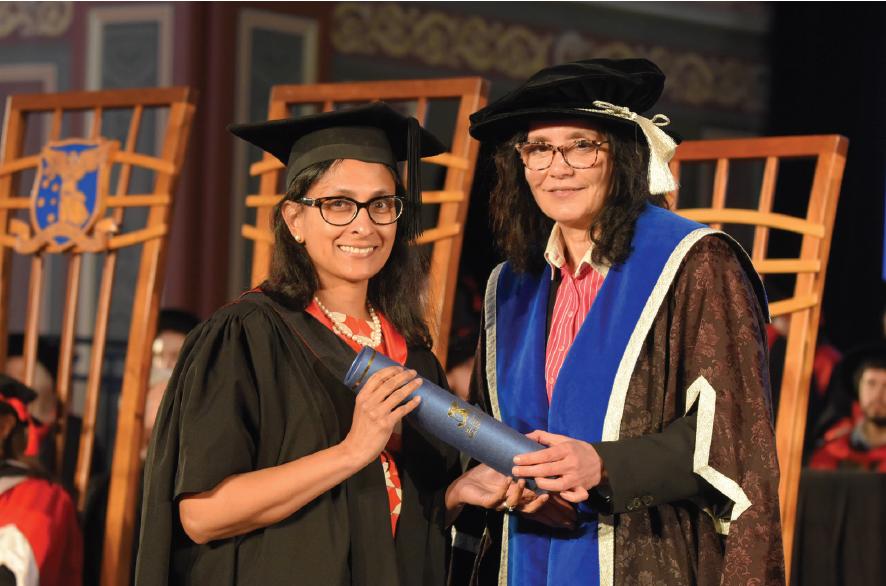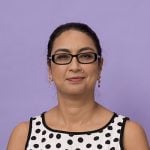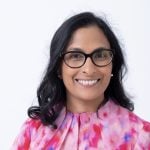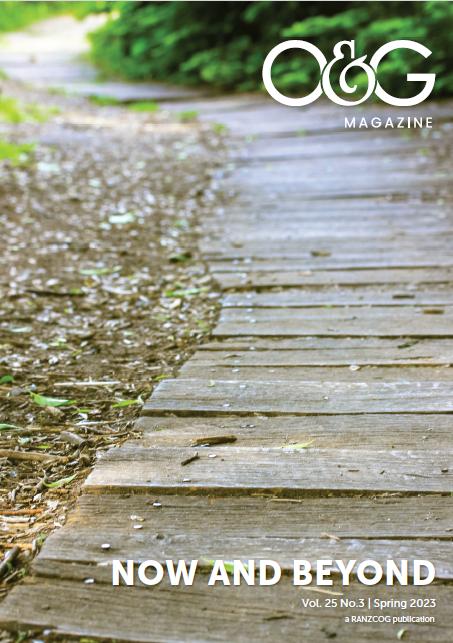This feature sees Dr Nisha Khot in conversation with women’s health leaders in a broad range of leadership positions. We hope you find this an interesting and inspiring read. Join the conversation on Twitter #CelebratingLeadership @RANZCOG @Nishaobgyn
I started writing Leaders in Focus in 2020, when I took over the column from Dr Kirsten Connan. The last three years have been hugely rewarding for me on a personal level. This has been a labour of love and my aim has been to highlight the diversity of our membership. I thank readers for their support and encouragement which has kept me going for longer than I had planned. However, the time has come for me to gracefully retire from this role. As I write my last column, I can’t help but reflect back to 2020 when the RANZCOG Board and Council were predominantly male with very little diversity. Contrast this with the upcoming presidency of Dr Gillian Gibson, our second woman President and our second New Zealand President. The new Board is probably one of the most diverse the College has ever had. Our leadership is truly beginning to look like our membership and we can all be very proud of our advocacy. We can’t afford to get complacent now. It is only by remaining vigilant will we build on our current achievements. Before I retire, I hope to celebrate RANZCOG’s first (but not only) Indigenous president.
While I am sad to be bidding farewell to this regular opportunity for conversations and connection, I know that the impact of the stories in this column will last forever. I welcome trainees or members who are keen to carry on this work to submit an expression of interest to the publication’s committee at [email protected]
It is only fitting that I should interview Dr Archana Rao, someone I have long admired, for my last Leaders in Focus. Dr Rao, a gynaecological oncologist, is the Chair of the CGO Subspecialty Committee at RANZCOG. When you imagine a gyn-oncologist, what image comes up in your mind? I am fairly confident that it is not that of a soft-spoken, petite, Indian lady with kind eyes. Archana is all of those things! She is a UNSW medical graduate and was a NSW O&G as well as gyn-oncology trainee. She was a staff specialist at Royal Hospital for Women in Randwick until 2019. She is currently based in Brisbane at the Royal Brisbane and Women’s Hospital, as well as the Wesley Hospital.
Archana kindly sat down with me for an interview smackbang in the middle of RANZCOG accreditation by Australian and New Zealand Medical Councils. We had a long chat about many issues and I hope you will enjoy getting to know Archana as much as I did.
What made you choose medicine?
I belong to the direct entry cohort of medical graduates. I went straight from Year 12 into medicine. I was always interested in the sciences and also interested in economics and politics. Although, I considered law as an option, at the last minute I made the decision to study medicine at University of New South Wales instead. The one factor that tipped the balance in favour of medicine was my strong desire to be ‘useful’, to have a purpose and medicine felt like the right choice to achieve this.
What was your childhood like?
I grew up in Armidale in rural New South Wales. Looking back, I think I had an extraordinary and amazing childhood. My dad migrated to Australia in the mid 1970s, taking up his first academic position after finishing a PhD at the University in Armidale. Soon after, he married mum and she came out with him to Australia. Their original plan of spending a few years in Australia turned into a lifetime. My siblings and I were born in Australia. Growing up, we had lots of opportunities for travel to India and also to other parts of the world, courtesy of my father’s work. We experienced living in different parts of the world, very different from rural Australia. Armidale is pretty great since it is a rural town with a university. The access to educational opportunities for us as kids that Armidale offered were really important for my parents. There was a close-knit, small Indian community and this was also very important for them as migrants and became important for me and my siblings, culturally, to know where we came from, and what it meant to be of Indian heritage. It helped us develop a strong sense of identity and this has stayed with us into adulthood.
What made you choose O&G as a specialty and then gynaecological oncology?
This happened slightly by accident. I didn’t have great experiences of O&G as a medical student and had pretty much ruled it out as a career path. I was also quite interested in medical oncology and didn’t think that I was suited to a surgical specialty. As it turned out, I had a really good experience as an intern in my very first rotation with a surgical team who encouraged me to consider specialising in surgery. And then I ended up being asked if I’d like to swap into an O&G rotation. I thought if I’m potentially going down the surgery road, I want to feel comfortable examining women and an O&G rotation might not be a bad thing. Also, swapping my rotation meant I could stay on in Newcastle and wouldn’t need to do a long commute over summer! As is common, the unit was very short staffed. I was the resident for gynaecological oncology for half the term and I really loved it! I was still worried about doing obstetrics. I was advised to keep my options open because gyn-oncology was a difficult sub-speciality to pursue. However, I was very clear that I was starting O&G training with the aim of becoming a gyn-oncologist.
Have you looked back and thought maybe I should have done something else?
No, I am very fortunate in the decisions that I’ve made. I feel like my work has meaning, value and purpose. Of course, there are some frustrations and many challenges. But no matter what you do in medicine, you know that you are making a difference, and this means that you always have purpose. I have never had any reason to question my decision.
What was your experience, if any, of racism and or sexism through childhood, training and working in Australia?
I think I am very late to the party in understanding the concepts of intersectionality and intersectional feminism. I grew up in a first-generation migrant family with academic, university-educated parents. There was a huge emphasis and value placed on education as a means of widening one’s opportunities.
However, there is an impact of looking different and standing out in a room as being different. What we now call microaggressions, were just the way things were. It was quite normal to be asked ‘where are you really from?’ or to have your name mispronounced because it was foreign sounding. In many ways, I sought to minimise these issues and it’s only in the last few years that I have come to recognise them for what they were.
I was reading a recent article by Dr Rhea Liang titled On being entirely ordinary and reflecting on my own experience of being as it were, not ordinary. I acknowledge I have enormous privilege and still there has often been that lingering question of ‘do I really belong here?’. The silver lining is that as our College becomes increasingly diverse, we can all be entirely ordinary, in Rhea’s wise words.
The theme for this issue is where we’ve come from and where we are going. From a gynaecological oncology perspective, where do you think the subspeciality has come from and where do you see the subspecialty going?
That is a great question and one that is discussed a lot within the subspeciality itself because of the major changes in gyn-oncology practice. Some of the skills I worked extra hard to acquire, I rarely use in my current practice. I did a 6-month position in a peritonectomy unit to expand my skill set to be able to perform extended cytoreductive surgery procedures. At that same time, the first trials of giving neoadjuvant chemotherapy started to be published, and subsequently, there has been a shift away from radical surgery. I thought I need to be able to do a minimally invasive radical hysterectomy and there’s now a randomised control trial led by a principal investigator from Australia showing the clear benefits of open surgery over minimally invasive surgery. Evidence shifts things in a way that’s good for women, but it also changes the nature of the procedures that we’re doing and the training opportunities that are available. Increasingly, gyn-oncologists are also either performing or supporting colleagues with complex benign surgery and even getting involved with obstetrics in the surgical management of adhesive placental disorders. Our subspeciality is no longer limited to cancer surgery.
In both, Australia and New Zealand, we serve a diverse population and a geographically dispersed population. We know the benefits of centralisation of cancer care. And yet we also know that this centralisation can become a barrier to people accessing care. We, therefore, have a huge challenge of a small workforce trying to deliver the same standard of care to everyone. These issues have not been a focus of curriculum and training in oncology and yet, now in practice, these are the challenges that we’re having to face. It is important to understand that gyn-oncology will continue to evolve, and we have to be flexible and adaptable to manage these changes.
The other significant change is our gyn-oncology workforce which now looks very different from when I started training. I hope this is something that encourages people who may have previously not have considered gyn-oncology, to think about it as a career. We now have diverse role models for trainees which sends a different signal from what used to be considered a male-dominated subspecialty.
What prompted your involvement with RANZCOG?
As an early career consultant, I felt a bit lost in some ways. I was working full time and had a heavy clinical workload. But I was also interested in contributing to the profession. There was a position for an early career CGO on the RANZCOG CGO Committee, and when the nominations came around, I decided to apply. I had the support of my mentor at the time, Prof Hacker. I started in this role and found I really enjoyed understanding how I could make a difference to the experience of trainees. I also started a Masters in surgical education around the same time. This brought with it a realisation that I had some additional skills as an educator to bring to the work of the College.

I took on the role of deputy chair of the CGO Subspecialty Committee which gave me a better understanding of the work involved. I was still quite junior and had a lot of learning to do. With the encouragement and mentorship of stalwarts like Prof Lee Yeung, Dr Andrea Garrett and Dr Rhonda Farrell, I stepped up to Chair the Committee at the start of this Council term.
It has been an interesting and valuable journey trying to understand the work that RANZCOG does and how its various committees work. My involvement with the College has made me recognise the huge amount of work that College staff do behind the scenes to make assessments, exams, and interviews work smoothly. I encourage all members to become involved with the College. We are the College and if we don’t like the way it works, each of us has the ability to contribute to committees or working groups and change the things we feel should be improved. It is easy to criticise the College from the outside and I understand people have many competing priorities so not everyone can take on additional College workload. If you can’t do it today because of your current situation, don’t discount it completely. When time and circumstances allow, do what you are able to do. At the very least, make sure you cast your ballot to choose who represents you in College leadership.
Are you involved in any projects currently?
As part of my Masters in surgical education, I have just published a qualitative study on the transition from Trainee to Trainer in gyn-oncology. This was my first experience of qualitative research and the themes that emerged pose an opportunity to look at the first 5 years post-qualification and support this transition phase. The study findings have broader applications to all new fellows.
I have also come to realise the importance of taking a scholarly approach to training, teaching and assessing surgical skills, and providing feedback to trainees. The era of ‘a good surgeon always makes a good teacher’ is well and truly over. Good surgical skills need to be complimented by good teaching skills for surgical training to be effective.
How do you achieve work-life balance?
This has been an interesting journey for me over the last few years. I worked full-time as a consultant in public healthcare in Sydney post-qualification. Just before the pandemic started, I moved to Brisbane while on maternity leave. Before becoming pregnant, I had envisaged that I would have 6 months of maternity leave before re-starting work. I was advised by friends and mentors to take 12 months off and am very glad that I took their advice. A new baby and the pandemic made me rethink my priorities and I made the decision to return part-time to public work. I now do some private work in addition to my public role, but continue to work less than full-time clinically. I recognise the immense privilege I have to be able to do this.
In the past, it was a badge of honour to work almost 24/7. I was my own worst enemy, feeling like I had to keep going. I no longer feel this way. Instead, I value time with my family as well as time spent doing non-clinical work, and recognise I have some agency in choosing how I spend my time, and the importance of aligning this to my values. The most important and, perhaps, the most difficult thing is changing our own mindset and giving ourselves permission to slow down and feeling comfortable with these decisions and choices. I am happy to have allowed myself this choice to do things differently.







Leave a Reply